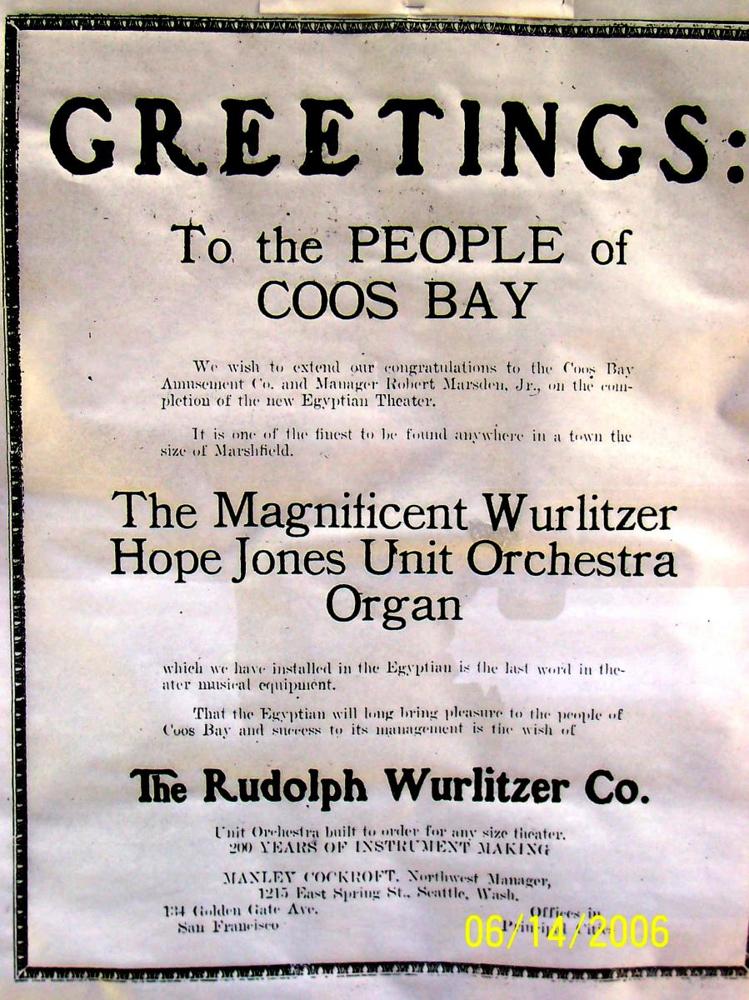The Rudolph Wurlitzer Co.
1925
Egyptian Theatre
229 S. Broadway
Coos Bay, OR, US
10 Ranks
Instrument ID: 25708 ● Builder ID: 7490 ● Location ID: 22648
⬆️ These are database IDs that may change. Don't use as academic reference.EXPLORE IMAGESVIEW STOPLISTSomething not quite correct?Suggest an Edit
IMAGES
Something missing or not quite correct?Add ImageorSuggest an Edit
STOPLISTS
Something missing or not quite correct?Add StoplistorSuggest an Edit
CONSOLES
Builder: Unknown
Position: Unknown
Design: Unknown
Pedalboard Type: Unknown
Features:
3 Manuals (61 Notes)32 Note Pedal10 RegistersElectrical Key ActionElectrical Stop Action✓ Combination Thumb Piston(s)Stop Layout: Unknown
Expression Type: Unknown
Combination Action: Unknown
Control System: Unknown or N/A
Something missing or not quite correct?Add ConsoleorSuggest an Edit
DETAILS
This instrument is: Extant and Playable in this location
Updated by Eric Schmiedeberg, who gave this as the source of the information: I played and worked on this instrument many times..
This is the second Wurlitzer that Portland-area organist Glenn Shelley had a hand in designing. Like the first one at the MacDonald Theatre in Eugene, Oregon, it contains the signature Krumet rank. That voice is rare in Wurlitzers below 26 ranks. It also contains a Quintadena, which is also unusual in a Wurlitzer of this size. These were usually found in Wurlitzers of 14 ranks or more. As far as I could tell, the Egyptian Quintadena was designed to provide color to the Tibia in that it provides the \"Tibia Twelfth\" sound to that rank. The Quintadena usually serves to add more color to Tibia/color reed combinations as well. It does here, too. However, its main role is with the Tibia in this instance, it seemed.
Please refer to organ ID 57050 for a run-down of the known \"Shelley Special\" Wurlitzers.
Database Manager on January 28th, 2019:
Updated by Eric Schmiedeberg, who has heard or played the organ.
This organ was the second Wurlitzer where Portland organist Glenn Shelley had a hand in its design. The presence of the rare (for Wurlitzer) Krumet rank is there--and another interesting digression from Wurlitzer practice for this size of organ--a Quintadena. The first \"Shelley Special\" Wurlitzer was the MacDonald Theatre 3/10 (single-rail console) in Eugene (opus 1003). This time the console is a double-rail 3-manual type.
A note about the Quintadena in the Wurlitzer tonal scheme: This rank is crucial to the truly authentic Wurlitzer sound in instruments over 13 ranks or so. Many theatre organists and theatre organ builders avoid them. However, I have found that they impart a great \"Hammond Jazz Organ\" sound to the Tibia chorus in Wurlitzers I have played and add interesting color to Tibia Clausa/color reed registrations. Gus Farny and Tiny James used them a lot to good effect, I think. Farny was a demonstration organist for Wurlitzer and his records exhibit the sounds that set Wurlitzer apart from the competitors. The Egyptian Quintadena is quite nice.
I have played the Egyptian Wurlitzer numerous times and did some major running down and fixing of dead circuits, murmurs and ciphers througout the organ. Luckily, the organ was built with brass-plug-adjustable magnets, so dead magnets were not an issue--unlike the bakelite \"black cap\" types.
I also overhauled the Pedal contact rail with new blocks and wiring as the original had gotten water damaged. This was a \"stop-gap\" measure to get things going again in a reliable way until the old cable and new cable for the Pedal could be joined by a union board. Along this line, I also went through all of the relays, switches and keyboards with contact cleaner. Bingo! She started to wake up! For around ten years or more the organ had only been used for Christmas concerts, really.
Tragically, the piano in the orchestra pit had suffered major water damage. It could not be saved. The player action itself was up high enough in the piano to avoid damage. That was salvaged.
As is the case with a few of the \"Shelley Specials\", the Egyptian organ was built without some of the tuned percussions normally found on a Wurlitzer of its size. The Egyptian was installed without a xylophone and set of tuned sleigh bells. This is exactly like Shelley\'s first Wurlitzer example at the MacDonald in Eugene.
The Egyptian organ definitely exhibits the qualities that frequently show up in Wurlitzers of its vintage. The Tibias are sweet and take trem nicely. Before 1927, Wurlitzer\'s Tibias got more hands-on attention by their voicers.
Database Manager on January 28th, 2019:
Updated by Eric Schmiedeberg, who gave this as the source of the information: The Wurlitzer Theatre Organ Installations List--Judd Walton--1972.
Technically speaking, this instrument would be best described as a Style H 3M Special, according to Wurlitzer\'s model line and terminology. Many times the organ descriptions in the shipping list are very general and not terribly helpful in \"dialing in\" just what would be going on with a given instrument design-wise. My model description is much more in keeping with what is really going on with this instrument.
Database Manager on March 23rd, 2007:
Identified through on-line information from James R. Stettner. -- Style H.
Webpage Links: PSTOS - Egyptian Theatre, Coos Bay Oregon
Related Instrument Entries: Unknown Builder (1956)
Something missing or not quite correct?Add NoteorAdd WebpageorAdd Cross ReferenceorSuggest an Edit
